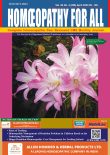A Focus on Homoeopathic Dilutions
Keywords:
fundamental, homeopathyAbstract
Homeopathic dilution is a fundamental
concept in homeopathy, a system
of alternative medicine developed
in the late 18th century by Samuel
Hahnemann. This method involves
serial dilution and succussion (vigorous
shaking) of a substance believed to
stimulate the body's natural healing
response. Homeopathic remedies are
often diluted to such an extent that no
molecules of the original substance
remain, raising ongoing debates
regarding their mechanism of action
and efficacy. Proponents assert that the
process imprints a "memory" of the
substance in the diluent, potentially
affecting the body energetically,
while critics point to the lack of
empirical evidence supporting these
claims within conventional scientific
frameworks. This abstract examines
the principles of homeopathic
dilution, its theoretical basis, common
preparation methods, and the
scientific controversies surrounding
its use. Recent investigations into
water memory, quantum coherence,
and nanostructures offer speculative
insights but remain inconclusive.
Despite skepticism from mainstream
medicine, homeopathy continues to be
widely practiced and studied globally.
Downloads
References
Jonas, W. B., Kaptchuk, T. J., & Linde, K. (2003). A critical overview of homeopathy. Annals of internal medicine, 138(5), 393–399.
2. Kanupriya AD. An attempt in understanding the science of high dilution: Theory and experiments. International Journal of Pharmaceutical Research. 2021 Apr;13(2).
3. Ullman D. (2021). Exploring Possible Mechanisms of Hormesis and Homeopathy in the Light of Nanopharmacology and Ultra
High Dilutions. Dose-response :




